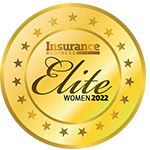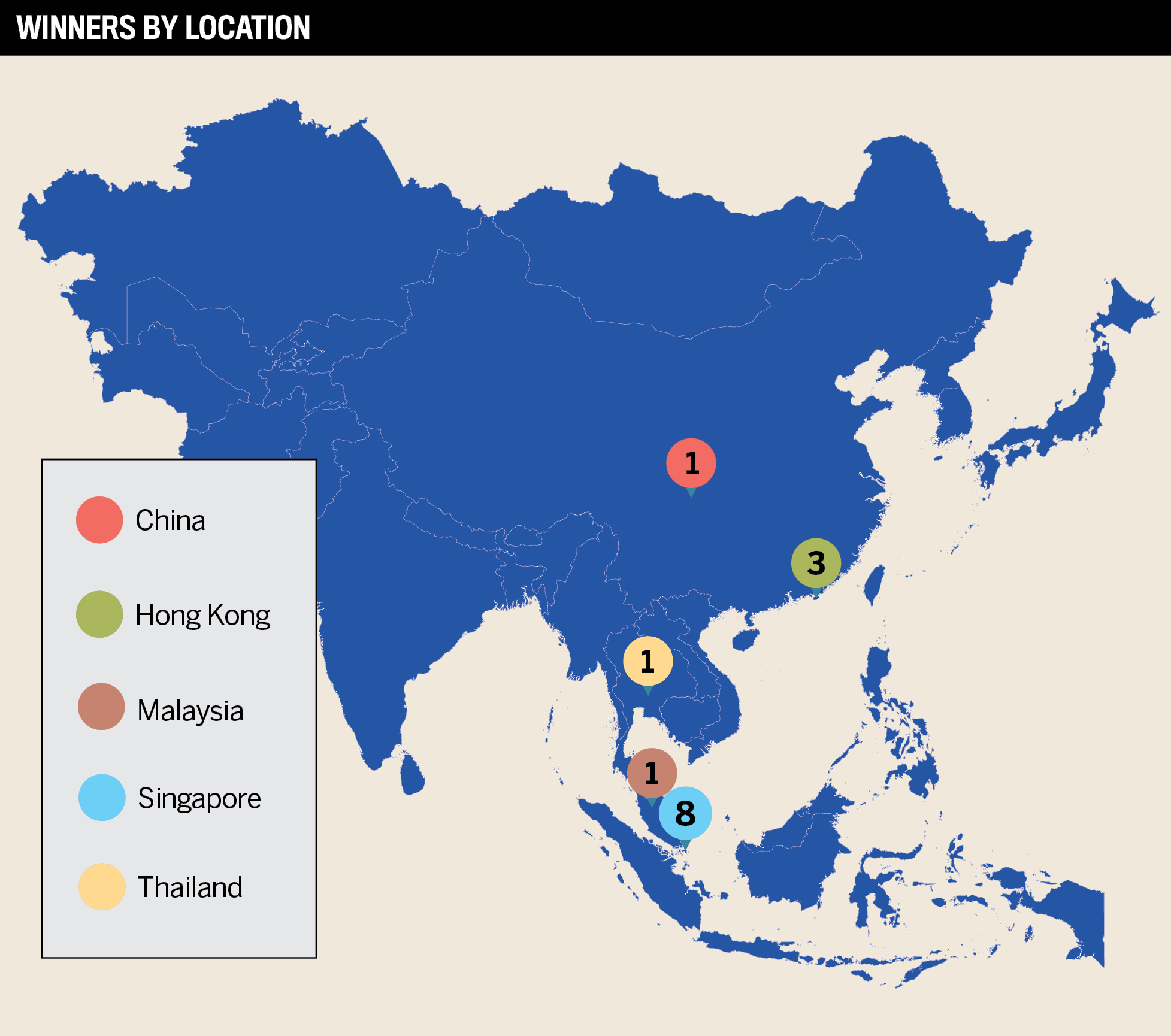
Elite Women 2022
Jump to winners | Jump to methodology
Time to shine
Things change. It’s no secret that professions such as technology, finance and insurance are traditionally male dominated. However, a strong cohort of women are bucking that trend.
Insurance Business Asia is proud to be honouring this echelon of female insurance professionals in Asia – trailblazers going the extra distance to meet the needs of their clients, co-workers and companies while maintaining outstanding professionalism.
The IB Asia team asked insurance professionals across the region to nominate exceptional female leaders in the industry for the 2022 Elite Women awards. The research team weighed up candidates' accomplishments over the past year, in addition to their contributions to diversity, equity and inclusion, as well as volunteer and charity work. From a broad field of entries, they selected 14 winners of this year's awards.
“We have found that companies with greater diversity, especially with more women, create 20%–25% more return for shareholders”
Violet Chung, McKinsey & Company
Lessons to be learned
The pandemic had a devastating impact globally, including on women in the workplace across Asia, according to Christine Phan, head of legal, risk and compliance in Asia and the Middle East at Berkshire Hathaway Specialty Insurance. One of the Elite Women this year, Phan says school and daycare closures, social distancing mandates that targeted traditionally female-dominated industries like retail and hospitality, and gendered expectations of who should be responsible for home schooling forced many women away from the workforce.
“Where office workers such as myself were able to continue working, it was because we were lucky to continue to have access to childcare,” says Phan. “But of course, this childcare came only because of the tremendous sacrifices of another female-dominated workforce – foreign domestic helpers in Hong Kong.”
Phan references the “Lean In” movement, inspired by the title of a book written by former Facebook CEO Sheryl Sandberg, who was the company's second-highest-ranking official. Sandberg argues that women need to assert themselves more in order to advance their careers. COVID-19, however, highlighted the ongoing predominance of entrenched systemic challenges that are not easy to overcome, according to Phan.
“The pandemic has undoubtedly had a huge impact on the lives of everyone and exacerbated the inequalities that have long existed in our society,” says Sabrina Chia, associate director, M&A underwriting at Fusion, and another Elite Woman this year.
“According to the International Labour Organization, women’s employment fell globally by 4.2% in 2020, compared with 3% for men. The ongoing crisis has shone a spotlight on the importance of the gender equality movement and rightfully so.”
A partner and leader in digital and analytics for financial services in Asia at McKinsey & Company, Violet Chung is another award winner. She says the pandemic has led to high rates of burnout for professional women across Asia, compounding gender inequalities, but Chung asserts that diversity can create valuable business advantages.
“We have found that companies with greater diversity, especially with more women, create 20%–25% more return for shareholders,” Chung explains. “Moreover, if you look at the number of women senior board members or executives as a percentage of corporate institutions, it is still at a low 25%. That number is going up, but there is still a long way to go.”
“The challenge for a company is, of course, finding a balance between work flexibility and fostering a team culture to drive strategy forward”
Christine Phan, Berkshire Hathaway Specialty Insurance
It's a worldwide issue
Echoing Phan’s view, Chia states that one of the ways in which Asia differs from other areas of the world, such as North America and Europe, is in the availability of more affordable childcare. In Singapore, for example, it’s relatively easy to employ live-in help for housework and childcare. Chia personally benefits from the fact that her children’s grandparents live nearby and are able to help.
Phan, who is American, laments conditions in her native country. In the US, the pandemic has forced women from the workplace. There are also the continuing ramifications of the #metoo movement and the controversial overturning of Roe v. Wade, the landmark decision that conferred the right to an abortion. Still, she says, some companies in the US are making strides in DE&I.
“In the US, regulators and shareholders – especially institutional investors – are demanding progress on this front,” explains Phan. “In Asia, the issues are the same but the discussions around them are still in the nascent stages, and by extension, regulatory requirements with respect to DE&I are in the early stages in Asia as well.”
One of McKinsey & Company’s reports found that women accounted for one in 15 entry positions and one in 50 C-suite roles. In Asia, the number of women at C-suite and senior-management levels can be 4% or even lower. This represents a huge loss of talent.
Chung adds: “Societal expectations of a ‘double shift’ in many Asian communities have also affected a lot of working women, especially during COVID-19, with 42% of women saying that they are burnt out. Many of them are expected to support other colleagues more than their male counterparts. By comparison, women in North America make up two-thirds of the entry level and [the insurance industry] is between 7% and 14% more diverse compared to other industries. Diversity in Europe is getting better as well, but the starting point was low.”
“The pandemic has undoubtedly had a huge impact on the lives of everyone and exacerbated the inequalities that have long existed in our society”
Sabrina Chia, Fusion
New normal
For Phan, the simplest way to improve working conditions in Asia is by adding more flexibility through policies like remote working, which has proven feasible and also highly productive during the pandemic.
“The challenge for a company is, of course, finding a balance between work flexibility and fostering a team culture to drive strategy forward,” she says. “To that end, there is still a long way to go in insurance, as a relatively traditional sector, with awareness of women’s issues and gender diversity at the senior management levels. The industry will not be able to find solutions that address the needs of working women unless they ask for their needs in the first place.”
It’s all about educating executives and boards to appreciate that diversity brings business benefits, says Chung. At McKinsey, women have more agency.
“Creating a culture of flexibility and support is especially important for women who want to start their own family or have a family they are caring for,” says Chung. “By working together with this level of understanding and empathy, clients I work with have improved their core capabilities, transformed with holistic impact, created happier workforces and improved both their top and bottom lines significantly.”
Chung emphasises the need for a top-down approach with programs that mandate CEOs or CXOs to spearhead support for women leaders and work towards a comprehensive approach in shaping diversity and inclusion.
“The holistic approach in shaping diversity and inclusion within firms must not simply frame initiatives as a ‘women for women’ program. Instead, companies should focus on creating ongoing and fundamental processes such as dashboards on women’s performance at each position that focus on empathy and understanding of diverse perspectives across not just gender, but also age and race,” she says.
As a working parent, Chia values childcare options and an appreciation of time demands. “More can be done as we look at cultivating a more inclusive workplace in today’s distributed workforce,” she says. “This means promoting a more transparent, flexible working culture that allows employees to thrive in their roles while still striking a healthy work-life balance. Such flexibility and autonomy will go a long way in creating an inclusive, supportive environment that empowers women to achieve their professional goals.”
Elite Women 2022
- Anusha Thavarajah
Chief Executive Officer, Life and Health, Asia-Pacific
Allianz Asia - Christine Phan
Head of Legal, Risk & Compliance, Asia Middle East
Berkshire Hathaway Specialty Insurance - Iris Chan
Executive Director, Construction, Hong Kong & Macau
WTW - Leng Leng Ng
CEO – Singapore
Gallagher - Nikki Quinn
Chief Operating Officer
AXA Singapore - Sabrina Chia
Associate Director
Fusion Specialty - Sally O'Hara
CEO
Krungthai-AXA Life Insurance PCL - Selina Lau
CEO
The Hong Kong Federation of Insurers - Sonali Verma
Head, Digital, CX and Innovation, Regional Bancassurance
Manulife Asia - Violet Chung
Partner
McKinsey & Company - Wong Sze Keed
CEO
AIA Singapore
Methodology
In March, Insurance Business Asia invited insurance professionals from across the region to nominate their most exceptional female leaders for the annual Elite Women in Insurance list. Nominees had to be working in a role that related to, interacted with, or in some way influenced the general insurance industry. They must also have demonstrated a clear passion for insurance.
Nominators were asked to describe their nominee’s standout professional achievements over the past 12 months, along with their contributions to diversity and inclusion in the industry and how they had given back through volunteer roles and charity work. Recommendations from managers and senior industry professionals were also taken into account.
The IB Asia team reviewed all nominations, examining how each individual had made a meaningful contribution to the industry, to narrow down the list to the final 14 Elite Women in Insurance.
Keep up with the latest news and events
Join our mailing list, it’s free!







